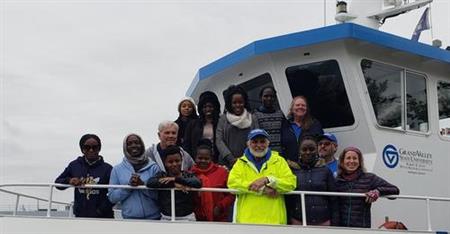
Scientists from two continents working together to improve the health of the African Great Lakes, affected by climate change, invasive species, fragile fisheries, algal blooms, etc.
Ruth Mathieson, Co-Chair of the International Service Committee for the Rotary Club of Belleville, introduced John Borst, a member of the Rotary Club of Kingston, to speak about IISD-ACARE's goal to save the Great Lakes of Africa (GLA). IISD - International Institute for Sustainable Development and ACARE - African Center for Aquatic Research. John's career in education spanned 36 years, including 3 years as Director of Education for the Dryden Board of Education. Now retired, he acts as an Education Consultant, writes articles in the magazine Education Today, blogs on Education in Canada and has served 7 years as a school trustee. In 2010 John joined the Rotary Club of Dryden, founding and editing the first Clubrunner website and was President in 2013/2014 as well as being active on the International Service Committee. In 2021 John moved to Kingston and became involved in the Rotary Club of Kingston.
The African Great Lakes are highly valuable natural resources, renowned for their rich fisheries and "biodiversity hotspots" Consequently, they and the ecosystem services they provide, underpin the welfare and livelihoods of over 50 million people across 10 countries. Despite the recognized importance of the African Great Lakes, they are threatened by the impact of human activity by numerous anthropogenic stressors at local, regional and global scales. The African Great Lakes are Albert, Edward, Kivu, Malwai/Nyasa/Niassa, Tanganyika, Turkana and Victoria.
The partnership between IISD and ACARE provides an opportunity for the world's freshwater laboratory and networks on the African Great Lakes to come together and strengthen science on large freshwater resources and the countries in which they reside. The partnership combines the legal and policy expertise of IISD and ACARE's newly created African network of large-lakes experts and scientists in Burundi, the Democratic Republic of the Congo, Ethiopia, Kenya, Malawi, Mozambique, Rwanda, Tanzania, Uganda and Zambia. During the first year, the new partnership will boost the activities of six Advisory Groups that were created to address specific issues on each of the African Great lakes. Members of each group are harmonizing priorities on the lakes to advance work on scientific inquiry, monitoring, climate change and education and training among other issues. IISD-ACARE established a program African Women in Science (AWIS) to train young African women scientists in water research, as women in Africa, like much of the rest of the world are under-represented in the field of aquatic science. Included in this training is to introduce this group to Canadian/American organizations involved in preserving the North American Great Lakes, spending a week in an area of 58 real lakes in Northwestern Ontario, doing experiments on those lakes. (pictured here are the AWIS participants with their guide and fellow scientist). The majority of the American portion of the trip has been funded by a single American philanthropist. The Canadian portion of $60,000 is currently not funded and John's goal is to help find the money via the 112 Rotary Clubs on the Canadian shores of the Laurentian Great Lakes plus clubs in District 5550 in northwestern Ontario, Manitoba and Saskatchewan. John intends to speak to 100 of those clubs.and raise $600 from each. His personal goals include educating Rotarians, creating a network of people concerned about fresh water, applying for a Global Grant, asking for a representative from each Rotary Club to help work on this project that will support specific areas of Rotary International's Areas of Focus, supporting the Environment, Water and Sanitation.
There are some interesting stats associated with the great lakes. The North American Great Lakes support 30 million people. The African Great Lakes support 62 million people and that is expected to double in the next 28 years, a real potential for disaster. The North American Great Lakes represents 23% of the world's water, the AFGL represents 25%. The annual fish yield for the AFGL is 1.5 million tons per year compared to NAGL of 25,000 tons per year. The Great Lakes Fishing Commission was founded in 1954. It took 40 years for Canada and the U.S. to create that commission. The AFGL have to do in 20 years what it has taken us 60 years to do.
Donations can be made personally or corporately as a Club by visiting https://www.iisd.org/awis
Terry Thomas thanked John for his presentation to a network of Rotarians in order to support the African Great Lakes. Peace and conflict prevention/resolution is also promoted within this project that ties in with Rotary International's areas of focus.
